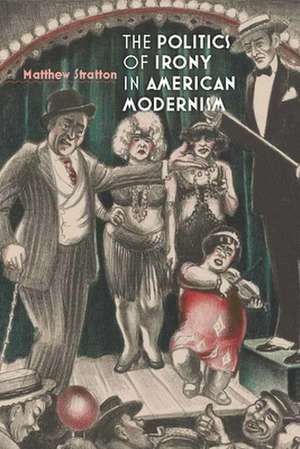The Politics of Irony in American Modernism
Autor Matthew Strattonen Limba Engleză Hardback – 31 oct 2013
Preț: 399.05 lei
Preț vechi: 518.25 lei
-23% Nou
Puncte Express: 599
Preț estimativ în valută:
76.36€ • 81.65$ • 63.67£
76.36€ • 81.65$ • 63.67£
Carte indisponibilă temporar
Doresc să fiu notificat când acest titlu va fi disponibil:
Se trimite...
Preluare comenzi: 021 569.72.76
Specificații
ISBN-13: 9780823255450
ISBN-10: 082325545X
Pagini: 304
Dimensiuni: 161 x 234 x 26 mm
Greutate: 0.52 kg
Editura: Wiley
ISBN-10: 082325545X
Pagini: 304
Dimensiuni: 161 x 234 x 26 mm
Greutate: 0.52 kg
Editura: Wiley
Recenzii
"Stratton makes a highly original contribution both to our understanding of irony as it is used in literary critical discourse and to the political history of American modernism. He succeeds in historicizing this notoriously vague and slippery concept, and he persuasively articulates new ways of connecting the literary and the political that don't privilege either one at the expense of the other."-Jonathan Greenberg, author of Modernism, Satire, and the Novel?
"Stratton makes a highly original contribution both to our understanding of irony as it is used in literary critical discourse and to the political history of American modernism. He succeeds in historicizing this notoriously vague and slippery concept, and he persuasively articulates new ways of connecting the literary and the political that don't privilege either one at the expense of the other."-Jonathan Greenberg, author of Modernism, Satire, and the Novel?
"Stratton makes a highly original contribution both to our understanding of irony as it is used in literary critical discourse and to the political history of American modernism. He succeeds in historicizing this notoriously vague and slippery concept, and he persuasively articulates new ways of connecting the literary and the political that don't privilege either one at the expense of the other."-Jonathan Greenberg, author of Modernism, Satire, and the Novel?
